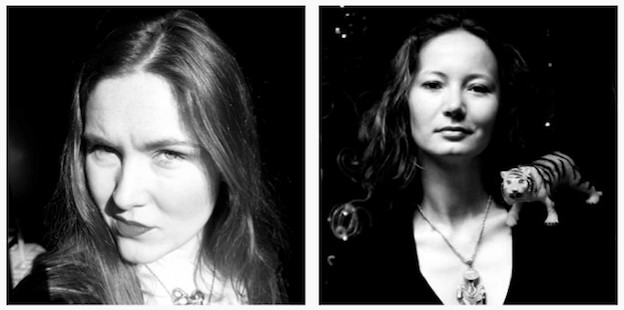Addendum to her howlings

This is a transcript of Órói or her poetical unrest, an aural note for Jacket2 on a.rawlings reading with Maja Jantar during the North of Invention conference, a Canadian poetry festival held at the University of Pennsylvania at Kelly Writers House in Philadelphia in January 2011, as seen and heard on PennSound.
If you’re reading this because you can’t hear the sound file (4:39), please follow me. I’ll guide you through it.
— I’ll tell you what you can’t hear.
First, about the sounds:
En guise d’accompagnement, a tapestry (from the Persian taftan, tabidan: “to turn, to twist”) inspired by a’s name and based on preparatory work for Telephone, a poetry journal from New York which asked me to translate Augusto de Campos, who called himself a concrete poet. I took the task literally and translated the name instead of the work. I started with A, using some of the sounds the letter can produce in English and in French (five, to be precise: a, a, a, a, and a). It’s dedicated to Edith Sitwell, who, in turn, called herself an abstract poet.
[Insert a silent sequence which will then be considered the normal, regular or standard silent sequence.]
I had to ask about her.
[Insert a shorter silent sequence.]
I had to bug people to know about her.
(To bug someone [as you would bug a room] helps to listen.)
[Insert a slightly shorter silent sequence than the previous shorter silent sequence.]
I asked a friend who happened to know her (un hasard, he’s translating Wide slumber for lepidopterists in French), and who told me about another friend, and I asked her.
[Insert a similar slightly shorter silent sequence.]
I asked François Luong who’s from Strasbourg and who has lived in Houston and who’s now in San Francisco, and I asked Karen Hannah who’s from California and who has lived in Korea and who’s now in San Francisco.
[Insert a standard silent sequence that feels longer than it is.]
He says they’ve been looking for the center of the Earth, working on a geological site full of Icelandic digressions. / She says she sails, wholly unfettered. / He says to think about her is tiring. The idea of her. He can’t wrap his mind around it. Too numerous dimensions, he says. / She says she has natural urges to root and unnatural urges to unroot. / He says her wording’s comparable to an ecological spill. / She, a letterpress printer, says she’s smitten, and worked from a sound poem of hers. / He says her work’s hard to put into words.
[Insert a longer silent sequence.]
a.rawlings says she’s been displacing her body. She’s from Northern Ontario or maybe Toronto, she has lived in Belgium and Iceland, now maybe back where she came from. She’s been swerving between repetitious bruising and improvisational healing, using divinatory practices and line drawings, studying volcanoes and dancing, making nonstop nonsemantic hellos and devising a poetics of the corpoverbaurovisual.
[Insert a quarter of a standard silent sequence.]
I would like her to meet Susan Philipsz, who was born in Glasgow but who lives in Berlin. Her father’s Burmese. She was awarded the 2010 Turner Prize for art, but she only uses sound.
[Insert a standard silent sequence.]
A poet who doesn’t know better will use words and meaning as a place to start. A poet’s place to start should be anywhere. Displacing’s a good place.
a.rawlings, hats off to your good start.
Edited by Sarah Dowling